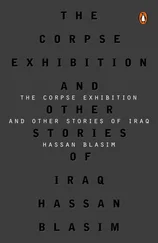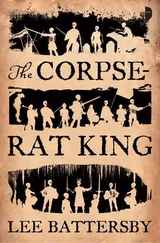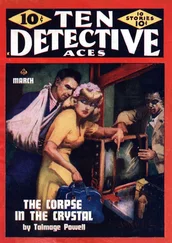Mr. Ismael noticed that I was sulking that day and asked me what was wrong, but I said nothing to him. I told Ammoury, who said that Hadi was jealous and I should just ignore him.
Mr. Ismael organized several artistic activities at our school, and we were asked to work together in groups to design a wall newspaper, which included literary texts and artwork. We also organized an exhibition which featured the best drawings of the year. He selected two of mine. One was inspired by al-Sayyab’s poem “Rain Song,” the other was of my father holding his worry beads. The drawings were hung on a wall close to the principal’s office, and the names and sections of students were written under them. The exhibition went on for a month and I was happy to see my name in big letters next to my drawings and to see students and teachers standing before them.
One day after class Mr. Ismael asked me: “What do you want to be when you grow up, Jawad?”
Without hesitation I said: “Jawad Salim.”
He laughed and patted my shoulder saying: “An artist. Why not? You can study at the academy, but you must keep to your drawing and never stop.”
I answered: “Of course, Sir.”
At the end of the year he asked me to go to his office after class and to bring my backpack along. The last part sounded odd. When I got there he asked me to sit down on the chair in front of his desk. He repeated what he’d told me throughout the year about my talent and unique eye. He said I was the best student in all of his classes, better even than those who were older. He added that talent was important, but it was not sufficient by itself and had to be augmented by constant practice and study.
He opened the drawer and took out two pads of the same sort he had given us at the beginning of the year. He took a plastic sack out of his leather bag and put it on his desk. He asked me to take out what was inside. I did and there was a midsize box of watercolors with two brushes and a set of pastels. I was delighted by the surprise and a bit shy. I didn’t know what to say except a soft “thank you.” He said that it was a gift to encourage me to develop my abilities. I thanked him again and told him that his was my favorite class and that I’d learned so much.
“You deserve much more, Jawad,” he said. “You will not be Jawad Salim, but you can be a fabulous Iraqi artist one day.” He looked at his watch and said that he had to go to another class. We shook hands warmly and I put his precious gift in my bag. I thanked him again and we said goodbye.
After our last class before the summer break I waited for the other students to leave, especially Hadi, and then gave Mr. Ismael a gift. It was a profile of his face I’d worked on for weeks until I got the best version possible. I wrote on the back: To the best teacher ever. From your grateful student Jawad Kazim. He was very happy as he looked at it. He said he would cherish it and frame it. He shook my hands warmly and patted me on the shoulder. He reminded me to keep drawing and said that he was looking forward to seeing what I would draw during the summer.
During the summer I filled the two pads with drawings after having practiced using watercolors on ordinary paper. I liked to draw with pastel too, but I focused on strengthening my hand with the brush. For the first time ever I found myself impatiently waiting for the break to end so I could show Mr. Ismael my new drawings.
On the first day of school I looked at the rosters of students and teachers and at the schedules posted on the wall next to the administration offices. His name did not appear anywhere and there was an X instead of his name next to “Arts.” My heart sank and I asked the assistant principal about him. He said that Mr. Ismael had been called up for military service and that they’d assign a new teacher.
When it was time for arts class on Thursday, the vice principal came into our classroom and said: “No arts. You can leave.” I inquired about the new teacher. He said: “There is no new teacher.” I asked why. He said: “No idea, son.”
The arts class became a free hour during which students had fun playing and running around, but for me it was impossible to fill that void with anything. I never studied art with any other teacher after that and never had any further formal training until I entered the Academy of Fine Arts five years later. One month after the start of that academic year in 1980, the war with Iran started. I always wondered about Mr. Ismael’s fate as I watched the footage of fierce battles on TV. I asked other teachers whether they’d heard anything about him, but no one knew anything.
She was all in black. I was late for my art history class that morning because I had decided to sleep an extra fifteen minutes past the alarm. The professor was strict about attendance and wouldn’t allow anyone who was more than ten minutes late to enter. Students called him “The Englishman” because of his obsession with time and because of the fluency and excessive — and somewhat pretentious — accuracy with which he pronounced various English terms. I was panting when I quietly opened the door to the lecture hall. I thought maybe he’d forgive me, but he shook his index finger and pointed to his watch and gestured to me to close the door. I did and walked to the kiosk outside the academy and bought a copy of al-Jumhuriyya. I read the headlines on my way to the cafeteria. Nothing new except military communiqués and constant victories over the enemy. I folded it and put it with my books. I went to the cafeteria, because I hadn’t had time to have breakfast at home. I bought a white cheese sandwich and a cup of tea.
There were no seats inside but it was warm so I went outside and found an empty bench near the theater department. A group of theater students wearing black were sitting around a palm tree. I sat down and began to devour my sandwich while reading the sports page as usual. My favorite soccer team, al-Zawra’, had lost two of its stars because they were called to the national team, which was preparing for the Asia Tournament. Al-Zawra’s performance had started to decline, and it had lost the previous day’s away match against Najaf, even though Najaf’s team was in last place.
I turned to the culture pages. There was a feeble poem about the war and under it an interview with an arts critic. I saw a long article about the Arabian Nights and the Arabic literary tradition and how both had influenced Latin American writers. I heard someone clap. It was one of the theater professors who was a famous experimental director. He had a cloud of white hair and was wearing jeans, a white shirt, and sunglasses. He asked the students around the palm tree to pay attention.
I went back to the article. It was discussing Borges’s fascination with the East and a story he’d written about Averroes, but I couldn’t concentrate. I heard the professor again explaining the exercise they were about to begin. He asked three of the students to sit on the ground and imagine themselves on a sinking boat and to act out their predicament without words. He asked the others to watch. One of the students asked what kind of boat it should be and the professor answered: “Whatever you like, as long as it sinks.” Most of them laughed.
I was intrigued, so I got up and sat on a closer bench to watch, but kept a reasonable distance so as not to be annoying. The professor called out three names and asked them to be the first to perform. Reem was one of them. She squatted on the ground and held her knees with her arms and looked to the professor awaiting his signal. She was wearing baggy black pants and a black cotton shirt with an open neck and long sleeves she’d folded back a few times so that her arms were showing. Her jet-black hair was tied back. The professor signaled for the sinking to begin.
Читать дальше












